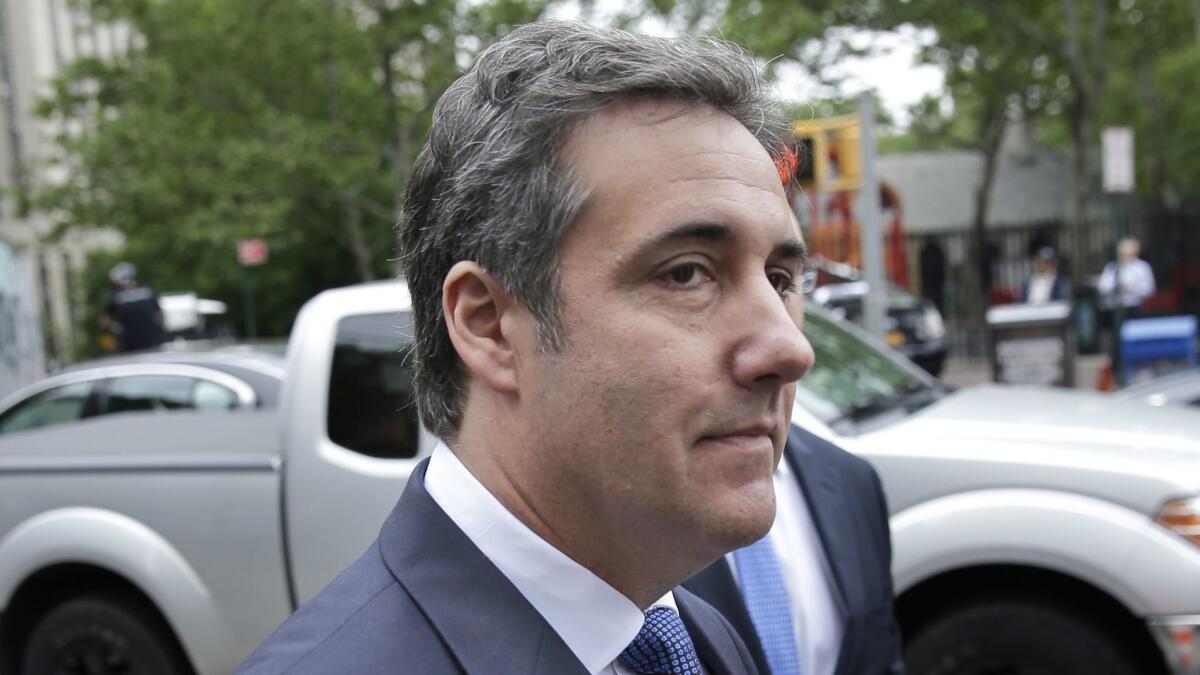Column: Novartis and the fixer: New details on a big drug company’s deal with ex-Trump lawyer Michael Cohen

- Share via
You know something is deeply wrong with a corporate transaction when the company’s defense boils down to: “We’re not crooked, just stupid.”
That’s the case with the big drug company Novartis and its $1.2-million contract with President Trump’s former self-described fixer, Michael Cohen. The Switzerland-based company has confessed that it “made a mistake in entering into this agreement,” in part because its executives knew after a single meeting that Cohen couldn’t deliver the services he claimed. Novartis did not “engage with him further” after that, the company said.
But a report released Friday by Senate Democrats shows that Novartis lied about its relationship with Cohen. The report documents several further contacts between Cohen and then-Novartis CEO Joe Jimenez.
Novartis’s relationship with Michael Cohen was longer and more detailed than previously detailed by the company.
— Senate Democratic report
These included an email exchange in which Jimenez forwarded a drug-industry wish list of regulatory initiatives ostensibly aimed at bringing down drug prices, some of which ended up in the Trump administration’s drug price “blueprint,” issued in May — a document that was widely seen as favorable to Big Pharma. Indeed, Novartis is among the drug companies that has put through significant price increases for its products since Trump took office in 2017 — in some cases more than 20%.
In another series of communications, Cohen pressed Jimenez to consider an investment in Yamo Pharmaceuticals, a drug company connected with a Cohen client and also with Russian oligarch Viktor Vekselberg, who has been questioned by federal prosecutors investigating Russian interference in the presidential election. Novartis didn’t invest, but Jimenez told Cohen he would look into the possible deal “personally.”
“Novartis’s relationship with Michael Cohen was longer and more detailed than previously detailed by the company,” the Senate report states. The report was prepared by the staffs of Democratic Sens. Ron Wyden of Oregon, Patty Murray of Washington, Elizabeth Warren of Massachusetts, and Richard Blumenthal of Connecticut.
The new information on the Novartis contract with Cohen sheds new light on how influence peddling is conducted in today’s Washington: flagrantly. Novartis made no bones about what it expected from Cohen: “Access to key policymakers” in the administration. Novartis was so anxious to make a deal, in fact, that it allowed Cohen to substitute vague language in the contract’s list of his duties. Moreover, the company made no efforts to determine in advance whether Cohen was likely to deliver.
Jimenez acknowledged as much in interviews after the contract became public in May. Cohen was selling “his expertise in terms of knowing the personalities that were in the administration,” he said. “This was right after the election. Things were moving fast,” he told Forbes. “The rhetoric around the Affordable Care Act was huge and we moved too fast without doing our due diligence.”
The Democrats’ report also raises questions about Novartis’ claim that it couldn’t break the Cohen contract, which had a one-year term at $100,000 per month, because it could only be terminated “for cause.” The Senate report observe that the contract required “satisfactory performance” as a condition for payment — a term Cohen plainly did not meet. Jimenez also acknowledged, in an interview with Bloomberg, “We should have just definitively parted ways with this guy as soon as we knew he was not going to be a help.”
Novartis signed the contract on Feb. 17, 2017, and had that first inauspicious meeting with Cohen on March 1. In a letter responding to queries from Sen. Murray, Novartis was candid about its instant misgivings about Cohen. It became clear during the meeting, it said, that “Mr. Cohen had made no effort to learn anything about Novartis, or the policy issues that were of concern to Novartis specifically, or the pharmaceutical industry generally.”
In its response to the report, Novartis says it was telling the truth about not “engaging” with Cohen after that meeting because it was Cohen who later initiated contacts with Jimenez on a “handful of occasions.” Obviously, this won’t do. The fact is, as the Senate report documents, Jimenez replied to those contacts — in the case of Cohen’s pitch for Yamo, within an hour. The Senate report also lists at least two entries in Jimenez’s calendar indicating that he was to originate calls to Cohen, though it doesn’t say whether the calls took place.
The clear implication of all these findings is that Novartis got rooked: It wanted an in at the Trump White House, and found that its inside man couldn’t deliver. But it’s also true that Novartis has gotten what it hoped for — a White House that isn’t serious, after all, about bringing drug prices down.
Keep up to date with Michael Hiltzik. Follow @hiltzikm on Twitter, see his Facebook page, or email michael.hiltzik@latimes.com.
Return to Michael Hiltzik’s blog.
More to Read
Inside the business of entertainment
The Wide Shot brings you news, analysis and insights on everything from streaming wars to production — and what it all means for the future.
You may occasionally receive promotional content from the Los Angeles Times.











